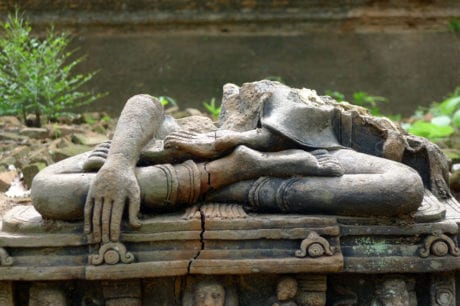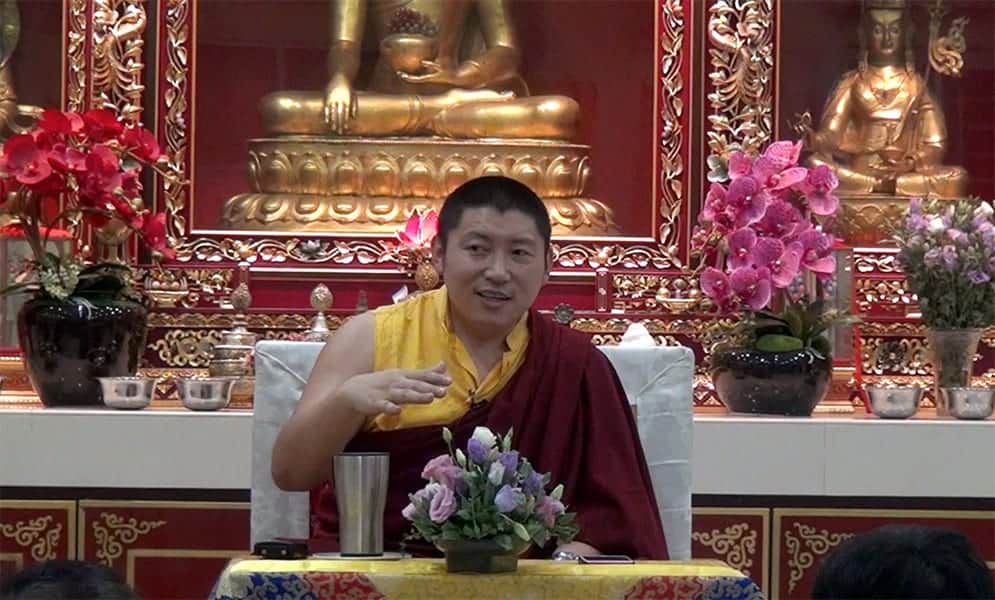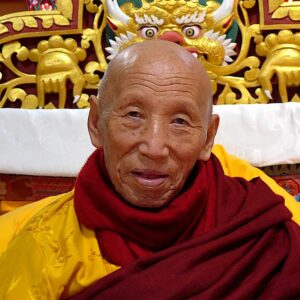Common Sense, Uncommon Sense: What is the Difference?
And what does it have to do with the Buddha’s teachings? These days, we may think that Buddhist monks are stuck in the past and don’t understand all the demands of modern life. They spend all their time meditating somewhere in the jungle and are baffled by modernity, right? In this public teaching in Singapore, Phakchok Rinpoche explains how modern lay people can benefit from understanding these ancient teachings.
Common Sense: Our Customary Habit Patterns
Most of the time in our lives, when someone says something good about us we are happy. On the other hand, if they criticize us, then we feel angry. We generally agree and say that is common sense. But we need to examine carefully, does this common sense really benefit us?
Uncommon Sense: The Buddha’s Radical Choice
Over 2,500 years ago, the Buddha chose a different approach. We could call it uncommon sense: meaning it was almost the opposite of how we commonly think.
Impermanence
Impermanence is one example. Normally, we don’t like to think about death. But death is actually a fact of nature that we must all confront. We get very afraid of loss and change, don’t we? Because of that fear we tend to avoid talking about or even thinking about death. And we think we have common sense! But let’s really check that. Is there anyone who is born who does not die? Is there anything we can construct that doesn’t break down?
Here, Rinpoche gives an example of applying a more uncommon sense. He tells a story about giving a young couple who were non-Buddhists some advice. He reminded the couple and he reminds us that we never know when the change will come. Do we really know when our time together will be over? That’s why he advises couples to enjoy their time together and appreciate each other. Because if we die angry at each other or feeling hurt and sad, then that is not a very good death, is it? Dying with a smile seems much more sensible, right? When we remember impermanence we may naturally become kinder and more gentle with each other.
Uncommon Sense: Impermanence isn’t All Bad News!
And of course, thinking about impermanence can seem unpleasant or a little scary. Especially when we are young, we feel that death is so removed and we don’t understand why we should think about it at all. But this attitude is like lying to ourselves. We’re not facing facts.
Impermanence actually brings us more happiness because we value our situation so much more when we know it won’t last. Moreover, impermanence means that negative situations aren’t that way forever. Many of us experience depression and sometimes it can feel tremendously dark and weighty. We can feel like we are the worst person in the entire world. But, if we think about it: impermanence reminds us that this state will not last.
Uncommon Sense: Meditation Practice
Common sense may seem more modern or relevant to us. Rinpoche suggests, however, that we investigate uncommon sense. Now, practicing meditation is becoming a more common practice: we may know many people who are doing it. Yet, meditation itself is a type of uncommon thought. Because when we meditate, we are actually interrupting common thoughts.
As we practice meditation, we investigate our most common emotions. What are our thoughts like? How do our habits seem to be? We have these common thoughts like anger and jealousy. First, we need to investigate which emotions or thoughts come up for us. Then, we can start practicing meditation. When we meditate, we check ourselves. How do we reduce these emotions? What are the triggers or causes that bring about emotions? Buddhism teaches that it is our mind, not external objects or situations, which triggers our happiness or unhappiness.
Take Time for Uncommon Sense: Who Are You?
We may think we are so busy that we can’t possibly have time to meditate. We have jobs, demands, and family responsibilities. Of course, this is true, but Rinpoche challenges us that we can find the time – after all he takes care of so many monks – and he travels and teaches! We can really take the time to develop some uncommon sense. Please take some time to examine and then you can gain some experience. Really ask some questions: Do I really exist? Who am I? Really?
Rinpoche gives some examples from his personal process of examining. We hear how to think about things and apply some deep reasoning. Then we can gain certainty. Physicists also examine an external object and can explain how our perception tricks us. In the same way, Buddhist logic shows us that things don’t exist the way we commonly think.
But don’t worry, you are not going to disappear! Do you exist? In your name? In your physical body? Or perhaps in your thoughts? By applying uncommon logic we can begin to understand that none of these things really exist. Again, please don’t think that you vanish.
The beauty of this uncommon view is that you have less suffering, and that’s quite a special discovery!
Reflection exercise
This week, spend some time really examining this “you” that you believe exists. We have to really take the time to investigate. Each time you think about this, try to really pinpoint that “you” that seems so solid.
Is it in your name or identity? What if people don’t know your name or it changes? Then do you still exist? If you find that there is no “you” in the name, then move on to your physical body.
Really take the time to think about this. If “you” is in the body, then where is it? What part of the body does it occupy? Does it have a shape or size or color?
And finally, begin to examine your mind or thoughts in the same way. Can you find a permanence anywhere? And if not, what is the implication? Does that perhaps bring you a sense of freedom?










Responses